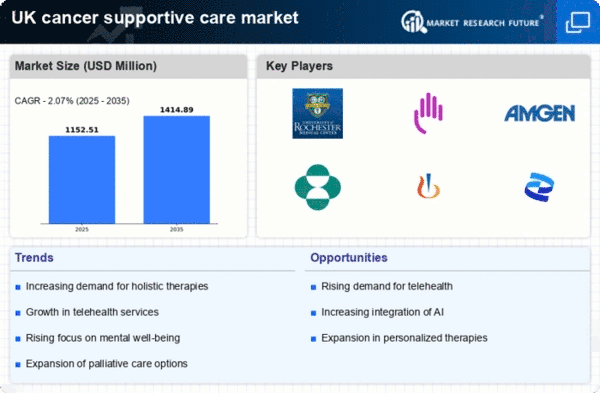Rising Cancer Incidence
The increasing incidence of cancer in the UK is a primary driver for the cancer supportive-care market. According to recent statistics, approximately 1 in 2 individuals will be diagnosed with cancer in their lifetime. This alarming trend necessitates enhanced supportive care services to manage symptoms and improve quality of life for patients. the cancer supportive care market is expected to grow as healthcare providers address the complex needs of this growing patient population.. Furthermore, the National Health Service (NHS) has been allocating more resources towards supportive care, indicating a shift in focus towards comprehensive cancer management. This rising incidence not only highlights the need for effective supportive care but also presents opportunities for innovation and development within the industry.
Increased Awareness and Education
There is a growing awareness and education surrounding the importance of supportive care in cancer treatment, which is driving the cancer supportive-care market. Patients and healthcare professionals are increasingly recognizing that supportive care is not merely an adjunct to treatment but an essential component of comprehensive cancer care. Initiatives aimed at educating patients about available supportive services, such as pain management and psychological support, are gaining traction. This heightened awareness is likely to lead to increased utilization of supportive care services, thereby expanding the market. Additionally, healthcare institutions are investing in training programs for staff to ensure they are equipped to provide high-quality supportive care, further solidifying the industry's growth.
Government Initiatives and Funding
Government initiatives and funding aimed at improving cancer care are playing a crucial role in the growth of the cancer supportive-care market. The UK government has been actively investing in cancer services, with a focus on enhancing patient support systems. For example, the NHS Long Term Plan outlines commitments to improve cancer care pathways, which include provisions for supportive care services. This financial backing is expected to bolster the availability and accessibility of supportive care, ultimately benefiting patients. As funding increases, healthcare providers are likely to expand their supportive care offerings, leading to a more robust market. The alignment of government priorities with patient needs is indicative of a positive trajectory for the industry.
Advancements in Treatment Modalities
Innovations in cancer treatment modalities, such as immunotherapy and targeted therapies, are significantly impacting the cancer supportive-care market. As these treatments become more prevalent, patients often experience unique side effects that require specialized supportive care. For instance, the introduction of CAR-T cell therapy has shown promising results but also necessitates comprehensive management of potential adverse effects. the cancer supportive care market is adapting by developing tailored support programs that address the specific needs of patients undergoing these novel therapies.. This evolution in treatment approaches is likely to drive demand for supportive care services, as healthcare providers aim to enhance patient outcomes and satisfaction.
Aging Population and Chronic Illnesses
The aging population in the UK is contributing to the growth of the cancer supportive-care market, as older adults are more likely to develop cancer and other chronic illnesses. With the proportion of individuals aged 65 and over projected to rise significantly, the demand for supportive care services is expected to increase correspondingly. Older patients often require more comprehensive care due to comorbidities and the complexities associated with aging. This demographic shift is prompting healthcare systems to adapt their supportive care strategies to cater to the unique needs of older cancer patients. Consequently, the cancer supportive care market is likely to expand as providers offer tailored services that address the challenges faced by this growing population..
















